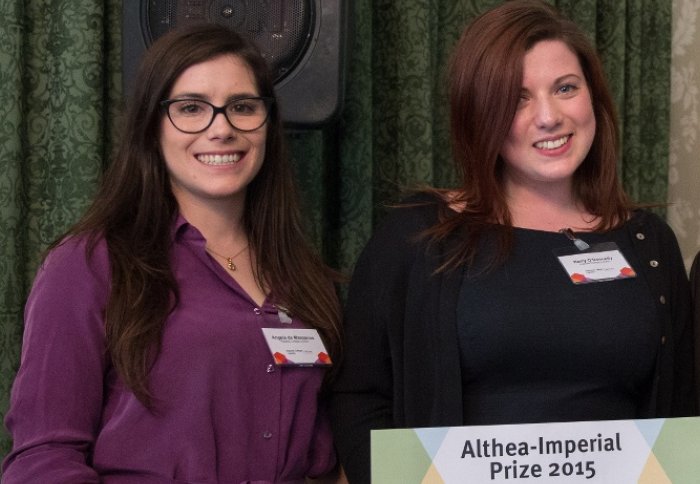Q&A with Althea runner up FungiAlert

Althea runners-up Kerry O’Donnelly and Angela de Manzanos talk about coming up with new ideas and the need for business and research to work together.
Can you tell me a little about how you came up with the idea and what convinced you that there was real business potential there?
We came up with the idea in 2014 as a result of a CDTDen competition launched in our department, the Institute of Chemical Biology. We both have worked in the same research group for over 4 years now, and we are very passionate about increasing food production, in addition, we had both individually been involved in entrepreneurial competitions in the past, and so when we first heard about the CDTen Dragons den competition we knew we wanted to base our invention on increasing food production. So after much research, we decided to focus on the development of an early detection device for plant disease, and we created FungiAlert.
We confirmed there was a real business potential after speaking with potential customers, and we realised there was a huge demand for a product like FungiAlert. In addition, winning both the CDTDen 2015 and VCC 2015 business competitions gave us validation that our company had potential to really make a global impact.
What are your thoughts on entrepreneurship in science – is it a good thing for scientists to be hooked into the business world?
In our opinion, entrepreneurship in science is an extremely valuable experience, as sometimes scientists create amazing technologies but a lot of the time, there is not a real demand for what they create. An introduction into the business world allows you to understand your customer’s demands, as there is little point spending huge amounts of time and money on something that does not have a validated use or customer. In addition, entrepreneurial experiences help you to communicate your solution to the outside world, for example, to customers, distributors, manufacturers, etc. This is essential for transferring technology from academic settings to the business world. If scientists understood the barriers that need to be overcome in order to launch a product/technology into the market, then it will help them be able to create technologies that could be serious game changers. Thus, we fully recommend anyone to get involved in an entrepreneurial experience, as the skills you will gain are vital when transferring the research into a tangible product to be used by clients.
How did it feel to be shortlisted and how have you found the whole process?
We have found the whole process very inspiring. All of the speakers at the Althea events have been inspirational and successful women, who have shared their experiences with us, allowing for us to build confidence in ourselves, and helped us to realise the importance of resilience in the business world. Liz and Rebecca from the Althea-Team have been amazing, always willing to help us, and to give us valuable advice to help develop our entrepreneurial skills.
We were thrilled to be selected one of the finalist of the first ever Althea Prize, as we are empowered to make a difference in the world, and to be successful female entrepreneurs. We feel very grateful to be given the opportunity to further advertise our business idea, as it has also allowed us to build amazing networks.
Article text (excluding photos or graphics) © Imperial College London.
Photos and graphics subject to third party copyright used with permission or © Imperial College London.
Reporter
Andrew Czyzewski
Communications Division